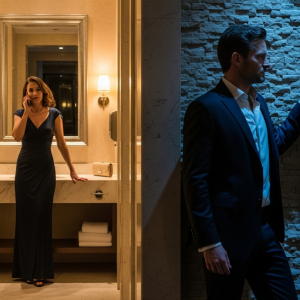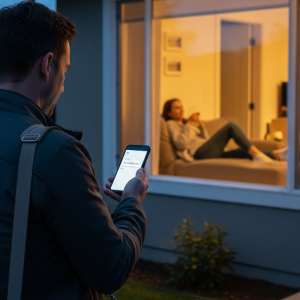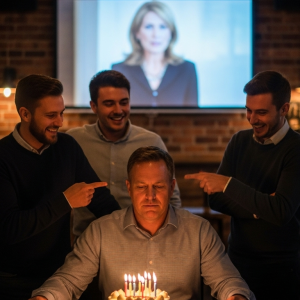My name is Aaron, and I’m thirty-one. If you told me five years ago that my wedding day would be the biggest act of quiet revenge I’d ever pull off, I would have laughed. I was never the type to hold grudges, always the one who tried to keep the peace, even when it hurt. But when your own family spends most of your life reminding you that you’re unwanted, something inside you eventually changes. It’s not an explosion or a meltdown. It’s slower, colder. It’s the sound of a door inside you quietly locking, and you throw away the key without even realizing it.
Growing up, I was the weird one. While my siblings, Mike and Jenna, were all about sports and popularity, I was the kid who loved books and wanted to talk about space at the dinner table. In my family, being different meant exclusion, disguised with phrases like, “Oh, we were just kidding,” or, “You wouldn’t enjoy it anyway.”
It started small. Birthday parties where my invite must have “gotten lost.” Family outings they “forgot” to tell me about. Then came the weddings. First, Jenna’s, when I was twenty-two. She sat me down, a fake, pitying smile plastered on her face.
“Aaron,” she said, her voice dripping with condescension, “I just think it’s better if you don’t come. It’s going to be a very… normal wedding. Not really your scene, you know?” She hugged me like she was doing me a favor. My parents brushed it off. “She’s the bride, she gets to choose,” my dad said gruffly. “Besides,” my mom added, “you would have been miserable there.”
Two years later, it was Mike’s turn. This time, they didn’t even bother pretending. I found out about his wedding through a Facebook post: a blurry shot of my entire family laughing around a banquet table. The caption was a smug, “Family is everything.” Not a single call. Just a public reminder that I wasn’t part of the club.
The final straw wasn’t a big blow-up. It was a random Saturday at Mike’s housewarming party. I’d driven an hour, determined to keep trying. When I arrived, Mike looked surprised to even see me. Inside, I was a ghost. People I’d grown up with gave polite smiles and then turned back to their real conversations. Later that night, I heard Jenna’s drunken laugh cut across the yard. “Well, at least Aaron didn’t ruin anything today! Must be a new record!” The whole table burst into laughter. No one defended me. It was just another joke at my expense. That was the night I decided I was done. I slipped out the side gate and drove home in silence.
A year later, something amazing happened: I met Lisa. She was everything my family wasn’t—warm, kind, and genuinely interested in who I was. For the first time, I felt seen. When I proposed, she said yes with tears in her eyes, and we started planning our wedding almost immediately. We both wanted it to be small, intimate, filled with chosen family—the people who actually cared about us.
One night, as we sat with our guest list, Lisa hesitated. “What about your family?” she asked gently. “Do you want to invite them?”
I thought about it. I thought about extending an olive branch. Then I thought about Jenna’s face when she told me I wasn’t welcome, the smug Facebook post, the drunken jokes, and the years of being treated like a ghost.
“No,” I said finally, my voice steady. “I don’t.”
Lisa just smiled and kissed my forehead. “Good. Because I want this day to be about love, not obligation.”
Of course, word got out. A week after we sent our invitations, I got a text from my mother. Heard you’re getting married. When are you sending our invites? No congratulations, no warmth. Just an expectation, as if their presence was a given, regardless of their behavior.
I stared at the message for a long time before replying. There’s no invitation.
The explosion was immediate. My phone blew up with angry messages from my parents, Mike, and Jenna. There were guilt trips, accusations, and even pathetic attempts to pretend we had always been close. Jenna posted a vague, passive-aggressive status on Facebook: Funny how some people forget where they come from. Hope they enjoy their little party without REAL family.
I didn’t respond. I didn’t argue. Instead, Lisa and I poured all our energy into making our day exactly what we wanted it to be. Our guest list was a collection of friends who had cheered for us, coworkers who had supported me, and neighbors who had treated me with more kindness than my own blood relatives ever had. These were the people who would stand with us.
And when the day finally came, when I stood at the altar and watched Lisa walk toward me with the biggest, brightest smile I’d ever seen, I realized something. For the first time in my life, I didn’t feel unwanted. I felt chosen.
But that wasn’t even the best part. The real surprise came right after the ceremony. My old neighbor, Mr. Halverson, a wiry seventy-year-old with more energy than a teenager, pulled me aside with a sly grin.
“Aaron, you’re going to want to see this,” he said, barely able to contain his smirk.
He led me to a small group huddled around a phone, practically vibrating with glee. They turned the screen toward me. There, in real time, was a series of frantic, angry posts from my family. Status after status complaining about how selfish I was, how family means forgiveness, how “blood is blood.” It was a pure, messy, public meltdown.
Jenna’s post was the most dramatic: Can’t believe my own brother would exclude us from his wedding after everything our family has done for him. Absolutely disgusting behavior. Someone had commented underneath: Didn’t you leave him out of your wedding? No response.
Mike’s was even worse: Guess Aaron forgot who helped raise him. Maybe he’ll remember when he’s all alone someday. Another commenter replied: You didn’t invite him to yours, right? Sounds like karma to me.
I could feel the eyes of my friends on me, but I just shook my head and smiled. Standing there, with Lisa’s hand slipping into mine and our true family laughing and cheering behind us, it finally hit me. I didn’t owe them anything. I had built my own table, and they weren’t welcome at it.
The days that followed were blissfully quiet, filled with the easy peace of newlywed life. But peace was something my family couldn’t handle, not when they weren’t in control. About a week later, the tone of their messages shifted from rage to a desperate, manipulative sweetness.
Family should stick together. Call me. We’re still your parents. We deserve to be part of your life. Think about how hurt we are, Aaron, after everything we did for you.
Still no apology. Still no acknowledgment of their own actions. Lisa and I made bingo cards for which guilt trip they’d try next. It was almost funny, until they showed up at our door.
It was a Wednesday morning. A loud, frantic knock. I peered through the peephole and saw them: Mom, Dad, Jenna, and Mike, all crammed onto our tiny porch like some grim family portrait. My mother held a casserole dish like a ridiculous prop.
I didn’t open the door. I cracked the window. “Hi, sweetheart,” my mom called, her voice overly bright. “We thought we’d come by and talk. You know, as a family.”
“No, thanks,” I said calmly. “We’re busy.”
“Aaron,” my dad barked, stepping closer. “Enough of this nonsense. We’re not leaving until you come out here and face your family.”
Jenna chimed in, glaring at Lisa, who was now standing behind me. “You’re letting her poison you against us!”
That was enough. I met Jenna’s gaze and said, “Nobody poisoned me. You did that all on your own.”
I took a deep breath. “You didn’t want me at your weddings. You didn’t want me at family holidays. You made your choice a long time ago. Now I’ve made mine.”
“You’ll regret this!” my mom hissed, the fake tears gone, replaced with naked rage.
“I already have everything I need,” I said, and closed the window.
For a moment, there was stunned silence. Then the banging started. Fists pounding against the door, angry shouts. They weren’t just yelling anymore; they were trying to force their way in. The part of me that used to freeze, to hope they’d change, was gone. It had been burned out.
“Call the police,” I said to Lisa, my voice low and even.
The sound of distant sirens was the sweetest sound in the world. The banging stopped instantly. When the two officers arrived, my mother rushed forward, casserole dish in hand, launching into a performance of a worried, heartbroken parent.
“This is our son,” she gushed, her voice trembling. “He’s been brainwashed by her, and now he thinks he can just cut off his family!”
The officer blinked, unimpressed. “So you were trying to force entry into the home?”
My dad stepped up, trying to use his usual intimidation tactics. “We have a right to see him. He’s our son.”
“Sir,” the other officer said, pulling out a notebook. “He’s an adult. You have no legal right to enter his home without permission. If you continue to harass him, he can press charges.”
I took a deep breath and said, loud enough for all of them to hear, “I want to press charges. For trespassing and attempted forced entry. And I want a restraining order.”
The porch went completely silent. My mother’s mouth dropped open. My dad’s face turned an alarming shade of red.
“You… you don’t mean that,” my mom stammered. “Aaron, we’re family.”
That word snapped something clean in me. I looked her dead in the eye and said, “No, we’re not. Not anymore.”
The officers issued them a formal warning and made it clear they’d be arrested if they ever showed up again. I filed the paperwork for the restraining order that afternoon. And just like that, with a few signatures, the door slammed shut forever
The days that followed were strangely quiet. No more angry calls, no more guilt trips. It was like they finally realized they’d lost.
It hurt sometimes, in small, sneaky moments. Holidays were hard. But the hollow ache in my chest slowly filled with better things. With real friends, with chosen family. With people who didn’t love me because they had to, but because they wanted to.
About six months after the wedding, Lisa and I hosted a barbecue at our place. I stepped back and just watched my wife laughing, our neighbors’ kids chasing each other, a group of people who genuinely loved and accepted me exactly as I was. I realized my family hadn’t just missed my wedding. They had missed everything. Every good thing that came after, every milestone, every ordinary, beautiful day.
And for the first time in my entire life, I didn’t feel sad about it. I felt free. As the sun dipped low, Lisa slipped her hand into mine. “We made a good life,” she whispered.
I smiled and kissed the top of her head. “Yeah,” I whispered back. “We really did.” And this time, I knew without a doubt that nobody could ever take it away from me.
It’s amazing how life works, isn’t it? You think you’re stuck in a pattern, that things will never change, and then, when you least expect it, you take the first step out of the cycle. That’s exactly how I felt as I looked at my wife, Lisa, and our friends, watching the laughter echoing around the backyard. For the first time, I wasn’t just surviving; I was living. And I wasn’t doing it for anyone else. I was doing it for me.
I never thought I’d end up here, away from my family, from the people who should’ve been my support. But what I learned the hard way was that family doesn’t always mean blood. Sometimes, family is the people who love you without asking anything in return, the ones who see your worth even when you can’t see it in yourself.
That evening, I couldn’t help but think back to all the moments that led me here—the isolation at my siblings’ weddings, the constant feeling of being an outsider, the rejection I never let myself fully feel until it was too late. For years, I’d swallowed the hurt, convincing myself it wasn’t that big a deal. But when Lisa and I started our lives together, it became clear that I wasn’t just pushing away a few bad memories; I was actively letting them define me. I let their treatment of me dictate how I saw myself and how I allowed others to treat me.
But all that changed when I met Lisa. She didn’t just accept me for who I was; she made me feel like I was enough. No matter how quiet or awkward I could be, she always made me feel like the most important person in the room. And when we started talking about our future, the one thing I knew for certain was that I never wanted to go back to that suffocating place where my family’s judgments, their harsh words, or their silences could hurt me again.
After filing for the restraining order, it felt like a weight had been lifted from my shoulders. For the first time in years, I didn’t have to look over my shoulder or second-guess every text, every phone call from a family member. They were no longer a presence in my life—at least not in the way they had been.
Of course, it wasn’t all smooth sailing. There were nights when I would lie awake, wondering if I had made the right decision, if I was wrong to cut them off entirely. Couldn’t I at least give them a chance to explain?
But then I would think of my wedding day—the way I felt walking toward Lisa, knowing that I was about to marry someone who loved me for who I was, not because of who I was supposed to be or what I could provide. She loved me, imperfections and all. That’s something I’d never had from my family. They loved me on their terms. They loved me when it was convenient, when it was easy. But as soon as I stepped outside their narrow definition of who I was supposed to be, I became a disappointment.
The strangest thing happened a few months after the restraining order was filed. I received an unexpected letter in the mail. It was from Jenna, my sister. No phone call, no text, just a letter—sealed in a plain envelope, with no return address.
I opened it, unsure of what I was about to read. But as I unfolded the letter, I realized it wasn’t an apology. It was her attempt at justification. She explained how she and Mike had always felt “stuck” in our family dynamic, that Mom and Dad had made them feel like they were doing the right thing by pushing me out. She talked about how they had to “keep up appearances,” how their lives had been too “disrupted” by my choices and that they felt the need to protect their own children from whatever “toxicity” they perceived in me.
She wrote that she didn’t expect me to forgive them, but she hoped I would at least consider the possibility of reconciliation someday.
I stared at the letter for a long time, unsure how to process it. Was it an olive branch or just a carefully worded attempt at assuaging her own guilt? I didn’t know. What I did know was that for the first time in a long time, I wasn’t angry. I wasn’t desperate for her to understand my pain or my perspective. I didn’t need her apology. I had moved on. I had built a new life with Lisa, and it was everything I had ever wanted.
The day I decided to burn the letter was the day I realized I was truly free. Not just from them, but from the chains of their judgment, their expectations, and their refusal to see me for who I was. I didn’t need their approval anymore. I didn’t need to hold on to their love when it was given so conditionally. I had my own family now, and the people who mattered most to me were here.
Lisa noticed the change in me immediately. “Are you okay?” she asked, one night as we sat on the couch, our feet up after a long week.
I smiled, genuinely this time. “I think I finally am.”
She squeezed my hand, her eyes full of that deep affection she’d always shown. “I love you, you know that?”
“I know,” I said. “And that’s all I need.”
It wasn’t until much later that I learned my father had tried to reach out again, this time sending a simple text asking if we could talk. I didn’t respond. It wasn’t that I hated him, it was that I had nothing left to say. The years of neglect, the years of silence, had already told me everything I needed to know. I didn’t need him to apologize. I didn’t need him to say anything. His actions had already shown me that my worth wasn’t something he was ever willing to recognize.
When I finally blocked him from all forms of communication, it wasn’t a decision I made out of anger. It was a decision I made because I had nothing left to prove. It was a decision I made for myself, and for the life I had built.
Months went by, and things settled. Lisa and I continued to build our life. We took weekend trips, enjoyed quiet nights at home, and spent time with the friends who had stood by me through all of this. Every time I looked at her, I felt a deep sense of gratitude. She had been my anchor, the one who held me steady while I learned to let go of the past.
The day we sat in the living room and decided to adopt a dog, I realized something profound: I had everything I needed. I wasn’t defined by my family anymore. I wasn’t defined by their rejection, their disappointments. I was defined by my choices, by the love I shared with Lisa, and by the life we were creating together.
It wasn’t a perfect life. But it was mine. And that was more than enough.
And for the first time in years, I could honestly say that I was finally free.




